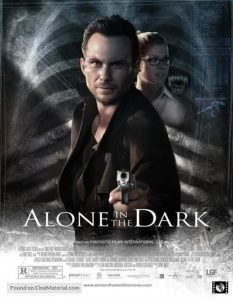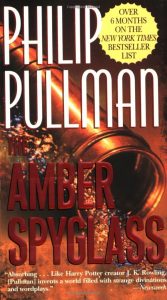 The first good thing I can say about Alone in the Dark is that, not ever having played the games it’s rumored to be based on, I can only see the faint outlines of the travesty that has been visited on the series, rather than being forced to embrace it in all its horror.
The first good thing I can say about Alone in the Dark is that, not ever having played the games it’s rumored to be based on, I can only see the faint outlines of the travesty that has been visited on the series, rather than being forced to embrace it in all its horror.
The next good thing I can say about it is that it doesn’t have a whole lot of needless plot getting in the way of the story. In fact, whenever plot does crop up, it is handled by Exposition Lad, a spirit that roams freely throughout the movie, initially possessing a museum security guard but willing and able to leap into any warm body as needed. This leaves Christian Slater free to brood, Tara Reid free to pout and take off her sweater, and Stephen Dorff free to shoot at things which are, as you might expect, in the dark.
The final good thing I can say about the movie is that it was absolutely snarktastic. Exactly bad enough to make mocking easy for the whole family, while at the same time just engaging enough that it’s more fun to wait for the next snark than turn it off and go on about eating your popcorn in the dark.
Problems: The two lead males did fine, but the rest of the acting was terrible. Terrible. Laylah speculates that Slater only took the role for a free grope at Tara Reid, and… well, it would explain a lot. The directing was also bad. Uwe Boll, who brought you the absolute worst sequence I’ve seen on celluloid in his first video game adaptation, House of the Dead, … I need to pause and paint this picture.
The House of the Dead is the first of a series of arcade and now console games where you have a gun instead of a joystick and shoot at zombies on the screen. You know the type, with the “reload” warning sound and you shoot off the screen to get more of an endless supply of bullets? So, there they are, the characters that haven’t had sex yet, shooting at all the zombies on the cursed island. This Boll guy, he thinks that, maybe in order to emphasize the game roots to his movie, he thinks that a good idea would be to edit in multiple animated screen shots from the game to intersperse with his actors woodenly marching forward and shooting at the camera. Seriously.
So, yeah. Mr. Boll has bettered his skills only by comparison here. The fact that he’s made a trademark out of blaring techno music while characters with guns shoot at hordes of evil things in incomprehensibly edited montages would be really funny, if he wasn’t listed for three more videogame movies over the next two years.
Really, though, without that two minute sequence, the rest of the movie was about as good as any other generic horror, not good enough to convince people to see who wouldn’t have gone anyway, bad enough to be fun without being depressing. My remaining complaint may be a spoiler, but it’s the kind of spoiler that people need to know when making up their minds, so here it is.
At no point in the film (and believe me, I was watching for it) was Christian Slater alone in the dark. It was a middle finger raised to the genre. Like setting Deep Blue Sea in the pool at the YMCA or Halloween in mid-April. Uwe Boll is fired.
P.S. If anyone actually sees it after reading this, a couple of things to watch for: The broken generator scene that was clearly put in as an example to film students of when a sequence serves absolutely no purpose, and the big scary payoff scene where the much-scarier-than-what-we’ve-been-fighting-all-along monster is revealed to be… well, I shouldn’t ruin it completely.
 All things considered, I’d rather live in the parallel universe where Philip Pullman wrote a better conclusion to his fairly nifty parallel universe trilogy, His Dark Materials.
All things considered, I’d rather live in the parallel universe where Philip Pullman wrote a better conclusion to his fairly nifty parallel universe trilogy, His Dark Materials. The first good thing I can say about
The first good thing I can say about